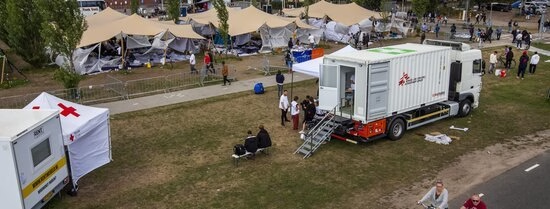Professor of Humanitarian Aid and Reconstruction Thea Hilhorst has recently been surprised by the situation in Ter Apel: "Of course this is not necessary, we can easily free up a sports hall or something. Food packages were thrown over a fence, as if it was a zoo. Why can this exist?" On NPO Radio 1 in Dr Kelder en Co she talked about her research and sketched the bigger picture about the reception of refugees worldwide. She even ends the interview on a slightly positive note, because in general humanitarian aid is going much better now than before.
It turns out that many people do not want to leave their homes and a lot has to happen before they leave. In addition, they want to resume their daily routine, such as cooking, as soon as possible during their flight. This self-reliance is now also being facilitated more, whereas aid organisations used to take a lot more work off their hands.
Biggest crisis in Yemen
Hilhorst once again emphasises where the worst humanitarian situation is in the world, in Yemen: "There, eight out of ten people do not have enough to eat and there is a lack of medical care. But hardly any refugees come from there, because people are almost locked up in that country." Because few refugees from Yemen come to the West, there seems to be less attention paid to it by us, is the wry conclusion.
Still many initiatives for aid in the Netherlands
Despite the fact that the situation in Ter Apel has gotten so out of hand, Hilhorst concludes that the Netherlands is not doing so badly when it comes to humanitarian aid: "Even though it is not through the traditional channels such as the church, you can see that on an individual level there are many initiatives and money is being collected".
Things are really better than before
She is even slightly positive about the historic developments of international aid. "From about 1860, we have developed a kind of shared humanity that not only makes us feel Dutch, but in a way commits us to the people very far away, that they don't die because of a disaster," she says. "We are now maintaining this system together and I think this is one of the finest institutions we have internationally. It is also much better than it used to be, sometimes a million people died in a disaster. But if you look beneath the surface, of course there is a lot going on and things could be better in many places."
- Professor
- More information
Listen to the interview (in Dutch)
- Related content

